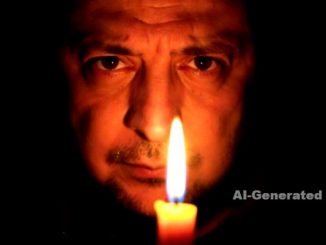
The Kremlin dictator appeared to seek to set a trap for Volodymyr Zelensky as he unleashed Shahed kamikaze planes at Ukraine’s capital city and other regions
| Published May 11, 2025
U.S. President Donald Trump praised Russian President Vladimir Putin’s proposal for direct peace talks with Ukraine, calling it a “great day for peace.” Trump expressed optimism about the potential to end the conflict, emphasizing the importance of halting the “bloodshed” and restoring stability.

However, Ukrainian President Volodymyr Zelenskyy responded cautiously, welcoming the gesture but insisting that a full, unconditional 30-day ceasefire must precede any negotiations. Zelenskyy emphasized that “the very first step in truly ending any war is a ceasefire.” Despite a Russian-declared ceasefire from May 8–10, both sides accused each other of violations, and Russia resumed drone attacks immediately after the truce expired.

(From left to right) British Prime Minister Keir Starmer, President Volodymyr Zelenskyy, French President Emmanuel Macron, Polish Prime Minister Donald Tusk and German Chancellor Friedrich Merz in a show of unity of the ‘coalition of the willing’ in Kyiv on Saturday
European leaders, including French President Emmanuel Macron, German Chancellor Friedrich Merz, Polish Prime Minister Donald Tusk, and UK Prime Minister Keir Starmer, supported Ukraine’s stance, demanding a full, unconditional 30-day ceasefire starting May 12. They warned of “massive” new sanctions on Russia’s energy and banking sectors if Putin refused.
Despite these diplomatic efforts, skepticism remains about Putin’s intentions, especially after Russia launched a massive drone attack on Ukraine just hours after proposing peace talks. Critics view this as a ploy to pressure Ukraine while continuing military aggression.
Implications of Putin’s Peace Proposal for the Russia-Ukraine War
1. Diplomatic Openings but Deep Mistrust:
-
Putin’s proposal for direct peace talks is a significant diplomatic gesture, but Ukraine’s demand for a 30-day ceasefire shows deep mistrust of Russia’s intentions.
-
Without a verified ceasefire, any negotiations risk being used as a strategic pause for military advantage.
2. Pressure on Ukraine from Western Allies:
-
European leaders’ support for Ukraine’s ceasefire demand demonstrates unity, but it also places pressure on Kyiv to avoid being seen as obstructing peace.
-
If Zelenskyy rejects talks despite Western support, it could strain relations with European allies.
3. Potential Escalation or Stalemate:
-
The immediate resumption of Russian drone attacks after the brief truce suggests Moscow may use talks as a tactic while maintaining military pressure.
-
Failure to achieve a stable ceasefire could lead to a prolonged conflict, with continued civilian suffering and military losses.
Vladimir Putin unleashed a massive drone blitz at UkraineCredit: East2West
4. Risk of Russian Manipulation:
-
Critics view Putin’s offer as a strategic ploy to avoid new Western sanctions while continuing hostilities.
-
Russia could use talks to regroup its forces or secure concessions from Ukraine without making significant compromises.
5. Increased U.S. Diplomatic Engagement:
-
Trump’s direct involvement highlights the U.S. role in seeking a resolution, which may enhance American diplomatic influence in the conflict.
-
However, it also risks complicating negotiations if European and American approaches diverge.
6. Potential for Sanctions and Economic Fallout:
-
If Russia refuses to honor a 30-day ceasefire, European leaders have threatened “massive” new sanctions targeting Russia’s energy and banking sectors.
-
Such sanctions could further damage the Russian economy but also impact global energy markets.
7. Humanitarian Concerns:
-
The continued conflict risks worsening the humanitarian crisis in Ukraine, with ongoing civilian casualties, infrastructure destruction, and mass displacement.
-
A failed peace initiative could dampen international support for refugee aid and reconstruction.
Overall Takeaway:
While Putin’s proposal for peace talks signals a potential diplomatic breakthrough, the lack of a solid ceasefire and continued hostilities raise concerns about Russia’s sincerity. Ukraine, supported by Western allies, insists on a ceasefire as a prerequisite, creating a tense standoff. The situation remains fragile, with the risk of further escalation or diplomatic failure if trust is not rebuilt quickly.
SOURCE: DAILY MAIL ONLINE – Putin savages Ukraine with drone attack hours after announcing Istanbul ‘peace talks’ that Trump called a ‘potentially great day’
AP NEWS – Ukrainian president welcomes Russian overtures, but says ceasefire must come before peace talks
THE IRISH SUN – VLAD ATTACK Putin bombards Ukraine with swarm of attack drones in huge aerial blitz just hours after proposing direct peace talks






Be the first to comment